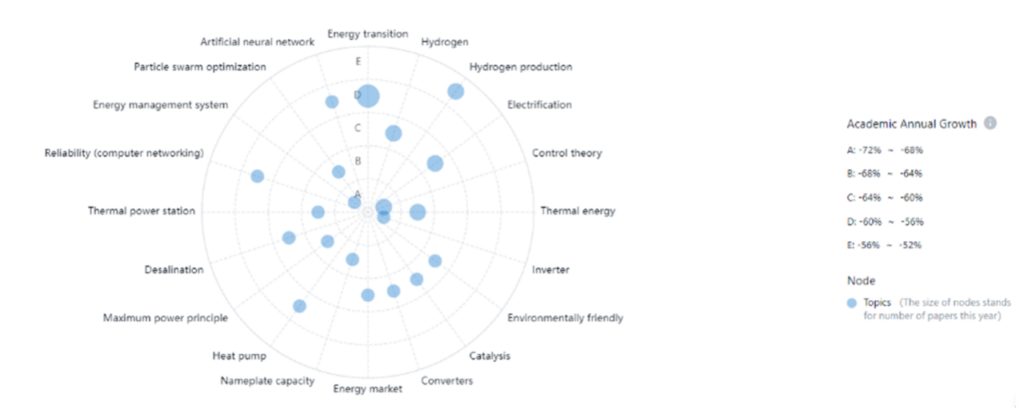7 Renewable Energy Companies to Look Out for in 2023
The Paris Agreement, signed in 2015 by 196 parties, has placed a spotlight on the importance of renewable energy companies. Zero-carbon solutions have become competitive in sectors representing 25% of emissions. However, by 2030, it’s expected that these solutions will be competitive in sectors representing 70% of global emissions.
As technology advances, countries are working to reduce the amount of Green House Gas (GHG) emissions they release into the atmosphere.

Top Countries of Origin, Renewable Energy, PatSnap Insights
China, a major player in this effort, has committed to becoming carbon neutral by 2060 and increasing the use of carbon-free energy sources, such as building 150 more nuclear reactors in the next 15 years. Other countries are also developing sustainable energy technologies.
There is a strong focus on hydrogen production and energy transition, as well as continued growth in solar, wind, and biofuels. (As the chart below illustrates).

Emerging technologies in the Renewable Energy Space, PatSnap Discovery, (B) Word Cloud from Market reports, PatSnap Discovery
This article explores 7 renewable energy companies to watch out for in 2023.
This article was curated using our AI-powered Discovery Product, which connects billions of patent and non-patent data points. Get the technology insights and competitive intel you need.
Emerging Renewable Energy Companies:
- Aurora Solar, a California-based unicorn founded in 2013, revolutionized the way solar power is utilized in daily life. The company, led by founders Christopher Hopper and Samuel Adeyemo, created software for designing, selling, and delivering solar installations, making renewable energy more accessible to everyday customers. In February 2022, the company raised $200 million in Series D funding to support its expansion in the solar industry.
- Siqens GmbH is a German startup that specializes in creating self-sufficient energy systems. The company focuses on developing fuel cells that extract hydrogen from sustainable sources, such as green methanol or biomass. Its goal is to play a role in reaching net-zero emissions by 2050. Sigens GmbH was recognized for taking an innovative approach to fuel cell technology with the f-cell award in 2012.
- Celtic Renewables Ltd, an Edinburgh-based company, combines biotechnology and renewable energy to generate biofuel from biological industry by-products. The company specializes in developing biobutanol, a direct replacement for diesel and petrol that requires no engine modifications, using Scottish Malt Whisky by-products. In 2020, Celtic Renewables established its first production facility in Scotland after obtaining over £20 million in funding.
- Inti-Tech, a Chilean company, has developed autonomous robots to clean solar panels in both centralized and decentralized power plants. Its technology aims to increase energy output by removing dust from panels, which can otherwise cause a loss of 20% of energy output. Customers have reported an average increase of 15% in energy output as a result of the maintenance provided by these robots. Inti-tech also offers other technological and automation solutions to improve the efficiency and ease of operation of renewable energy systems.
- H2Pro, based in Caesarea, Israel, specializes in producing hydrogen using environmentally friendly methods. Its proprietary technology, electrochemical thermally activated chemical (E-TAC) splitting of water, is a cost-effective way to obtain hydrogen without relying on expensive traditional electrolysis equipment. Despite being a relatively new company, H2Pro has already attracted significant investment, including a $22 million investment from Bill Gates, as governments and industries increasingly focus on reducing emissions through hydrogen production.
- SSAB, a Swedish steel-making company, is known for being in a highly polluting industry. However, the company has set a new goal to produce fossil-free steel. In 2020, SSAB built a HYBRIT pilot plant to reduce iron ore and replace it with hydrogen. In 2022, the company also developed a pilot plant for hydrogen storage. Through these developments, SSAB aims to convert a blast furnace into an electric arc furnace, with the goal of producing commercial-scale, fossil-free steel by 2026.
- Jinko Solar, a Chinese company, specializes in the production of microcrystalline silicon for solar energy. The company was a pioneer in creating a vertically integrated production process, covering all stages from silicon material to water, cell, and module production. On January 10th, 2023, Jinko Solar unveiled its ‘Second-Generation Tiger Neo’ panel family, known for its high power and efficiency.
Closing Thoughts:
In 2023, significant advancements in sustainable and renewable energy sources are expected. Both startups and major corporations are working to reduce their reliance on fossil fuels. This is a global effort, with companies from various countries contributing to the development of new technologies.
To stay informed about these developments, check out our Discovery and Eureka platforms, which provide access to billions of data points, including company news, patent trends, M&A activity, VC investments, and tech trends.